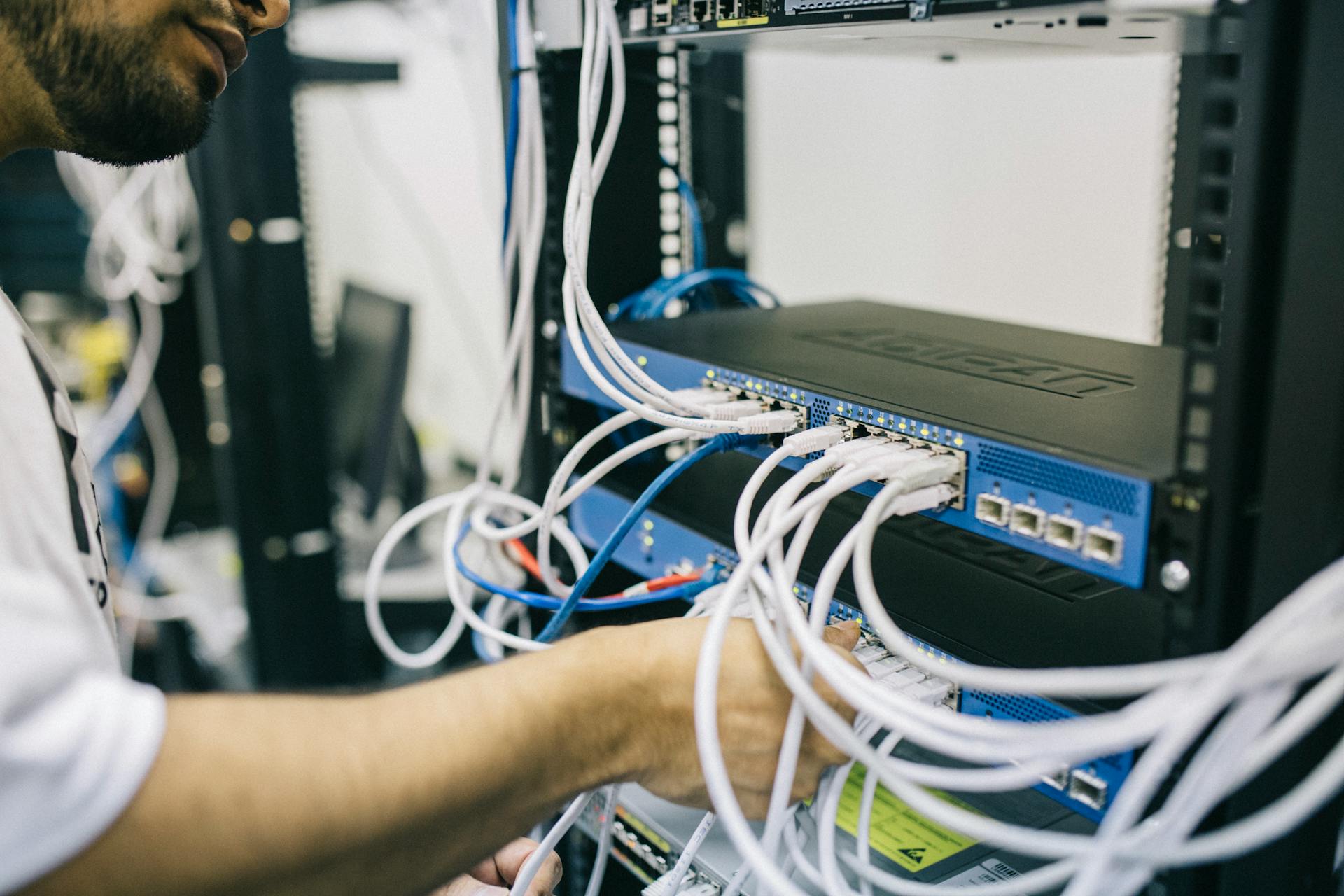
Google Workspace is a popular productivity suite used by businesses of all sizes, but is it HIPAA compliant? The answer is a bit more complicated than a simple yes or no.
Google Workspace has made significant efforts to become HIPAA compliant, but it requires additional setup and configuration to meet the necessary standards. This includes implementing a Business Associate Agreement (BAA) with Google, which is a critical step in ensuring compliance.
HIPAA compliance is crucial for businesses that handle sensitive patient data, such as healthcare providers and medical offices.
See what others are reading: Hipaa Compliant Workspace
Google Workspace Compliance
Google Workspace offers a range of tools that can help healthcare providers comply with HIPAA regulations. However, it's not HIPAA compliant out-of-the-box, and you'll need to take steps to configure it correctly. To start, you'll need to agree to the Workspace Terms of Service and Google Business Associate Addendum before creating, receiving, storing, or transmitting PHI. This includes communications via Gmail, unless a patient requests confidential communications via email.
To make Google Workspace HIPAA compliant, you'll need to configure its core services. Google provides a HIPAA Implementation Guide to help with this process. The Guide offers advice on how to configure specific services, monitor account activity, and set up security notifications. It also explains how to share PHI stored in Google Drive, create Data Loss Prevention policies, and disable third-party applications that may not support HIPAA compliance.
To ensure HIPAA compliance, you'll also need to separate user access to PHI and only grant access to those with the correct permissions. This will help prevent unauthorized access to sensitive patient information. You'll also need to comply with Security Rule requirements, such as responding to security incidents and terminating user access.
Gmail can be HIPAA compliant, but only if you use the paid version, Google Workspace emails. Even then, you'll need to follow best practices and put additional protocols in place for handling PHI. You may need to sign up for an extra-secure email service or obtain written consent from patients before sending PHI via email.
To use Google Workspace with PHI, you'll need to sign a Business Associate Agreement with Google. This agreement ensures that you'll protect patient information with the same stringent standards as your practice. You'll also need to review and sign the agreement before using Google services with PHI.
Intriguing read: Hipaa Compliant Translation Services
Here are the conditions you must meet before your Google Workspace account becomes HIPAA compliant:
- A paid version of Google Workspace.
- Signing a Business Associate Agreement (BAA) with Google.
- An Enterprise account (in some cases).
Google provides the tools to help you achieve HIPAA compliance, but it's up to you to use them correctly. As a customer, you're responsible for making your operations HIPAA compliant. Google gives you the tools, and how you use them depends on your IT administrators' efforts.
Automation and Management
Automation is the key to overcoming the challenges of maintaining Google Workspace HIPAA compliance.
Platforms like Zenphi allow G Suite administrators to streamline compliance-related tasks with ease.
Manual management of audit logs, user access, and file permissions requires constant monitoring and intervention, which can drain IT resources.
Automating these processes with Zenphi significantly reduces the workload by handling these tasks automatically.
Automating compliance tasks saves considerable time and eliminates the risk of human error, ensuring a much higher level of accuracy in managing compliance.
For example, Zenphi can automatically generate audit reports in seconds, whereas manual audits may take hours.
Take a look at this: Audit Risk Assessment Process
Automation Improves
Automation is the key to overcoming challenges and ensuring continuous HIPAA compliance in Google Workspace. Platforms like Zenphi allow G Suite administrators to streamline compliance-related tasks with ease.
Manual processes are inherently prone to human error, whereas automation with Zenphi eliminates the risk of missed steps or incorrect configurations. This ensures a much higher level of accuracy in managing compliance.
Automating compliance tasks saves considerable time. For example, Zenphi can automatically generate audit reports in seconds, whereas manual audits may take hours.
By automating tasks such as user access management, audit log generation, and file permissions change audits, Google admins can focus on higher-priority issues. This is achieved by setting up automatic alerts for non-compliance, allowing admins to take immediate action when issues arise.
The following core Google Workspace services must be configured to be fully compliant with the PHI conditions:
- Gmail
- Calendar
- Drive (this includes Google Docs, Sheets, Slides, and Forms)
- Hangouts classic (only the chat messaging feature)
- Google Chat
- Google Meet
- Google Keep
- Google Cloud Search
- Google Voice (managed users only)
- Google Sites
- Google Groups
- Jamboard
- Cloud Identity Management
- Tasks
- Vault
- Google Apps Script
Automation platforms like Zenphi provide a solution that not only saves time but also ensures compliance processes are executed consistently and accurately.
Are Add-ons?
Google does not come out and say that their add-ons are HIPAA compliant, so you'll want to tread carefully here. Practice smart policies when using all Google services.
Using Google Workspace add-ons can be a great way to automate and streamline your workflow, but be aware that their compliance with regulations like HIPAA is unclear.
Google Workspace Services
Google Workspace core services can be made HIPAA Compliant by a qualified IT administrator. To make them compliant, the following core services need to be configured:
- Gmail
- Calendar
- Drive (this includes Google Docs, Sheets, Slides, and Forms)
- Hangouts classic (only the chat messaging feature)
- Google Chat
- Google Meet
- Google Keep
- Google Cloud Search
- Google Voice (managed users only)
- Google Sites
- Google Groups
- Jamboard
- Cloud Identity Management
- Tasks
- Vault
- Google Apps Script
Note that Google Contacts is not compliant, so users should not store PHI-related information in it.
Security and Best Practices
Security and best practices are crucial for maintaining HIPAA compliance in Google Workspace. Google Workspace provides security alerts that notify administrators of potential security breaches or suspicious activities, allowing them to respond promptly.
To ensure accurate logging of user activity, automated systems should be in place, as inconsistent G Suite logs audit can be a challenge for admins. This helps maintain a record of all user activity, which is essential for compliance.
Manual configuration mistakes can result in missed steps, leaving sensitive data exposed. Google Workspace provides administrative controls that allow organizations to manage user access, implement password policies, and enforce data-sharing permissions, which helps mitigate this risk.
Recommended read: Hipaa Compliant Computer Disposal
Common Challenges
Maintaining HIPAA compliance in Google Workspace requires constant monitoring and management, which presents several challenges for admins. Inconsistent G Suite logs audit can be difficult without automated systems in place.
Ensuring that all user activity is recorded accurately can lead to errors if not done manually. Manual management of user permissions and access to PHI can be time-consuming and prone to mistakes.
Manually applying encryption settings or configuring security policies can result in missed steps, leaving sensitive data exposed. The risks associated with manual compliance management are significant, and errors in enforcing policies can lead to non-compliance and expose PHI to potential threats.
Manual configuration mistakes can lead to non-compliance and expose sensitive data. Errors in enforcing policies, incorrect configuration of security settings, or overlooked audit logs can have serious consequences.
For another approach, see: Pci Dss Non Compliance Fee
Account Security Importance
Account security is crucial for protecting sensitive health information. Millions of individuals are affected every year by healthcare data breaches.
Businesses and organizations may have to pay penalties between $100-$1.5 million per year, per breach, depending on the degree of negligence. This is a significant financial burden that can be avoided with proper security measures.
Here are the four ways unauthorized individuals can get access to your sensitive health records:
- Carrying out a data breach.
- Making/tricking your employees into sharing the information.
- Making/tricking your patients/customers into sharing the information.
- Physically stealing the information from laptops and mobile phones.
To prevent these breaches, it's essential to have strong passwords and enforce password policies. Strong passwords play a crucial role in protecting user accounts and preventing unauthorized access.
Google Workspace provides administrative controls that allow organizations to manage user access, implement password policies, and enforce data-sharing permissions. This includes encryption of information in transit and at rest, which is a key requirement for HIPAA compliance.
By turning on security alerts, organizations can proactively respond to any security incidents and mitigate potential risks promptly. This feature notifies administrators of potential security breaches or suspicious activities, allowing them to take swift action.
Additional reading: Hipaa Cyber Security
Business Associate Agreement
A Business Associate Agreement (BAA) is a legal contract that outlines the expectations of both parties regarding the protection and use of ePHI.
Google Workspace helps maintain HIPAA compliance through a BAA, which is signed for all eligible customers who use Google Workspace for this purpose.
To sign a BAA, you'll go through a series of screens asking questions about your business and whether it requires HIPAA compliance.
Once you click "I ACCEPT" after completing the screens, you've officially signed the BAA.
Understanding HIPAA
Understanding HIPAA is crucial for healthcare organizations to protect patient data. HIPAA is a legislation that outlines specific regulations for protecting individually identifiable health information.
The HIPAA Privacy Rule establishes national standards for protecting sensitive health information. This rule is essential for organizations to ensure they are handling patient data responsibly.
The HIPAA Security Rule includes encryption of information in transit and at rest, which is a critical measure to safeguard patient data. Google Workspace provides this level of security.
See what others are reading: Security Metrics Pci Compliance Cost
Google Workspace implements strict privacy controls and data access restrictions to remain in compliance with the HIPAA Privacy Rule. This ensures that patient data is protected from unauthorized access.
Organizations can manage user access, implement password policies, and enforce data-sharing permissions with administrative controls provided by Google Workspace. This helps to maintain the security and integrity of patient data.
Google Workspace Plans and Services
All Google Workspace core services must be configured by a qualified IT administrator to be fully compliant with the PHI conditions.
You can use all Google Workspace plans, but the Business Associate Agreement (BAA) only covers certain business and enterprise-level plans.
To make your Google Workspace services HIPAA Compliant, you need to configure the following core services:
- Gmail
- Calendar
- Drive (this includes Google Docs, Sheets, Slides, and Forms)
- Hangouts classic (only the chat messaging feature)
- Google Chat
- Google Meet
- Google Keep
- Google Cloud Search
- Google Voice (managed users only)
- Google Sites
- Google Groups
- Jamboard
- Cloud Identity Management
- Tasks
- Vault
- Google Apps Script
Compliance features are not present in Google Contacts, so it's essential to avoid storing any PHI-related information in this service.
Final Thoughts
Google Workspace provides a strong foundation for HIPAA compliance, but it's up to the organization to implement and enforce policies. By enabling two-factor authentication, turning on security alerts, disabling unused services, and enforcing strong password policies, healthcare organizations can maximize the security of patient data within the Google Workspace environment.
Compliance is a shared responsibility between Google Workspace and the organization itself. Google offers robust security features, but it's essential to configure and use services correctly to maintain compliance and protect patient data.
To ensure compliance, research your chosen services carefully to find out how to configure them to safeguard patient data and business. This includes using services that fall under Google's Business Associate Agreement framework, such as Google Workspace and Google Meet.
Expand your knowledge: Hipaa Compliant Direct Mail
Frequently Asked Questions
How much is Google Workspace HIPAA compliant?
Google Workspace is partially HIPAA compliant, covering certain products with a Business Associate Agreement (BAA) for paid subscribers
How do I make Google Workspace HIPAA compliant?
To make Google Workspace HIPAA compliant, you must review and accept Google's Business Associate Agreement (BAA) if you're a covered entity or business associate subject to HIPAA regulations. Reviewing the BAA is a crucial step in ensuring your Google Workspace setup meets HIPAA standards.
Is Google Workspace Confidential Mode HIPAA compliant?
No, Google Workspace Confidential Mode is not HIPAA compliant on its own. For HIPAA compliance, a more robust solution is required, such as a dedicated HIPAA-compliant email service.
Is Gmail HIPAA compliant in 2024?
Gmail is not HIPAA compliant by default in 2024, but it can be configured to meet HIPAA standards in 2025. For healthcare providers, using Gmail requires additional setup to ensure patient data is protected.
How much does HIPAA compliant Gsuite cost?
HIPAA-compliant Google Workspace costs between $18-$50 per user per month, depending on the chosen plan. Prices start as low as $18/month/user with HIPAA Vault's fully-compliant Gmail inbox.
Sources
- https://zenphi.com/google-workspace-hippa-compliant/
- https://www.hipaaguide.net/is-google-workspace-hipaa-compliant/
- https://www.givainc.com/blog/is-google-workspace-hipaa-compliant-gmail-meet-drive-g-suite-apps/
- https://www.googally.com/blog/is-google-workspace-hipaa-compliant
- https://www.juerntech.com/2023/06/12/is-google-workspace-hipaa-compliant/
Featured Images: pexels.com


